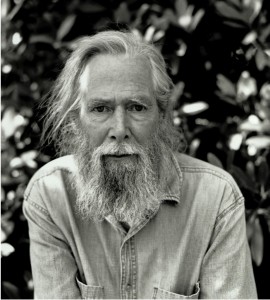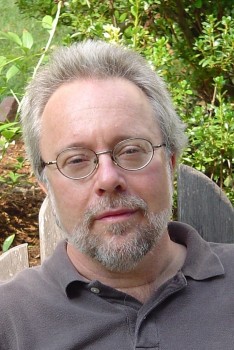.
It is not a bad fate for a poet to instead survive thanks to a small but impassioned readership, and it is my sincere hope that Sam Savage finds such a readership. His poems abundantly deserve their afterlife. —David Wojahn
.
Zero Gravity: Collected Poems (1981-2015) — Sam Savage
Numéro Cinq, Vol. VII, No. 3, March 2016
.
The poems of Sam Savage are quietly revelatory and informed by a certain oddness of perception that derives in some respects from surrealism—but to link his poems to any literary movement does them a disservice. Savage is a party of one, and it is baffling that his poetry has not found the readership that his fiction has enjoyed. His poems have a fictionist’s command of narrative, but his story lines are always implicit, and always compliment an astringent lyric acuity. Above all, his verse reminds me of something Stanley Kunitz observed about the poetry of James Wright, in which “things are capable of changing into their opposites, as suffering into joy, despair into radiance.”
As often as not, Savage’s poems emerge from the experience of uncertainty and pain, of the body in rebellion. Here is a characteristic passage, a description of patient being x-rayed: “Oh yes, says someone/ you don’t know, pointing to a bird-wing-like/ blur behind the white bars,/…………There’s this.” Yet Savage’s pervasive awareness of mortality almost invariably gives way to buoyancy, even to a kind of whimsy. We see this latter quality in especially satisfying fashion in his poems about an alter-ego named Kiffler, a character in the mode of Zbigniew Herbert’s indispensable creation, Mr. Cogito. That Savage can forge a poetry of such emotive complexity within the confines of a decidedly spare and minimalist style is a very significant accomplishment indeed. Witness the epigrammatic concision of the following poem, which I quote in full:
My Father’s Death
The sun had just come up
when all the light of my father died.
A lizard in its crept place opened one eye.
Ants climbed in spiral motion a stem of tall grass.
In that instant an instant was given.
It was shining as on the first day.
Birds sang brightly from the trees
and nothing was left that was obscure.
God is in the details, quipped LeCorbusier, and that is certainly the case here. I adore the description of the “lizard in its crept place,” and the grimly playful conundrum of “in that instant an instant was given.” And, above all, there’s the exquisite and pained epiphany of the poem’s final line.
Literary reputation, as we all know, is fickle. And to even employ a term such as “literary reputation” in respect to contemporary poetry seems more than a little absurd. Yes, a handful of poets at work today will be remembered, but that handful is not likely to include those figures who are currently at the top of the food chain. It is not a bad fate for a poet to instead survive thanks to a small but impassioned readership, and it is my sincere hope that Sam Savage finds such a readership. His poems abundantly deserve their afterlife.
—David Wojahn
.
David Wojahn‘s ninth collection of poetry FOR THE SCRIBE, will be issued by The University of Pittsburgh Press in 2017. His FROM THE VALLEY OF MAKING; ESSAYS ON CONTEMPORARY POETRY was recently published by the University of Michigan Press. He teaches at Virginia Commonwealth University, and in the MFA in Writing Program of Vermont College of Fine Arts.”


Is there still a copy of Sam Savage’s collection of poetry? It seems the link here is broken. I’m a huge fan, and would love to read everything I can get my hands on.
Unfortunately, Sam’s publisher is bringing out a book of these poems and asked us to take them down, which we did.